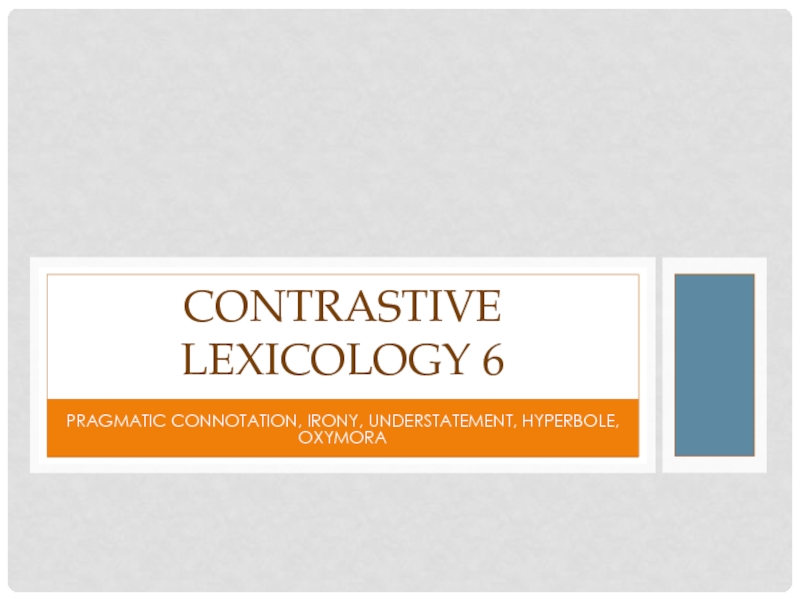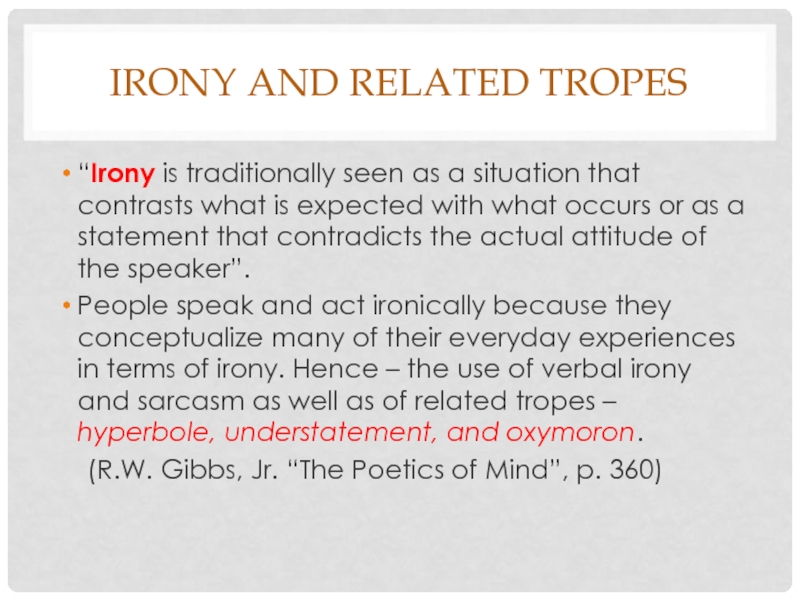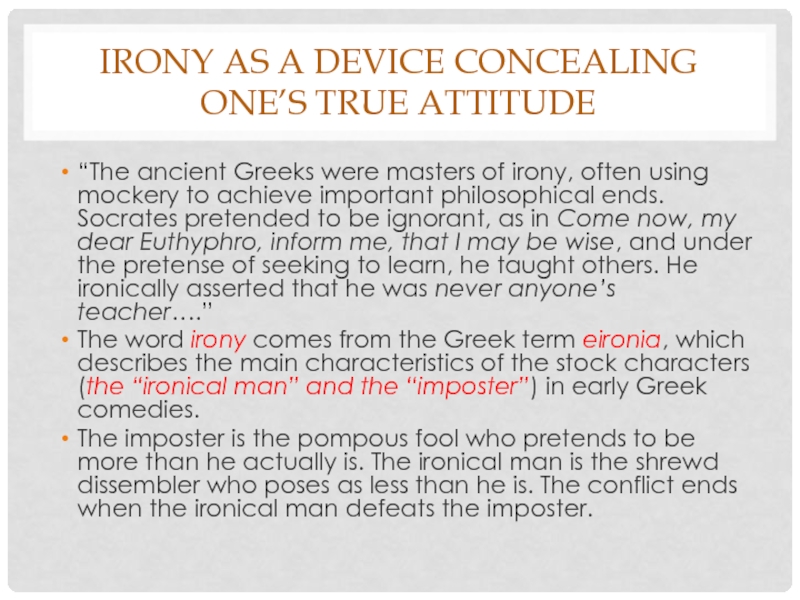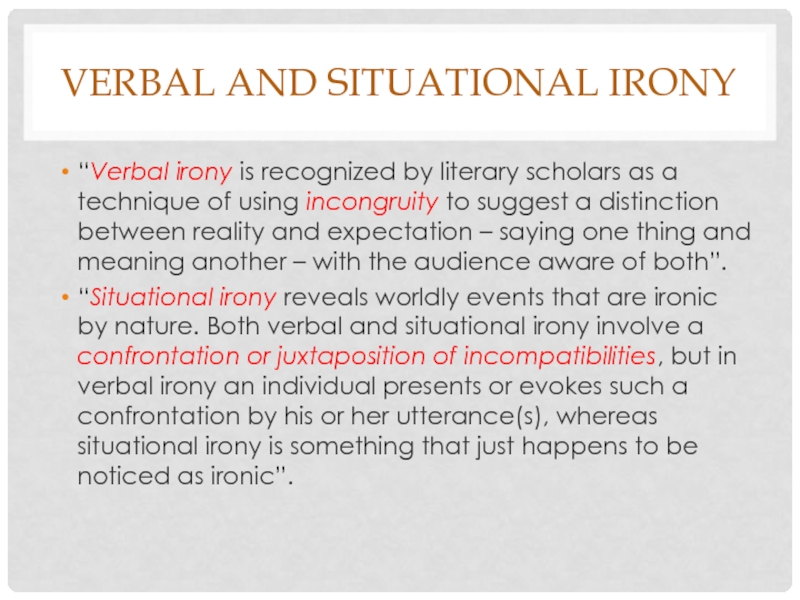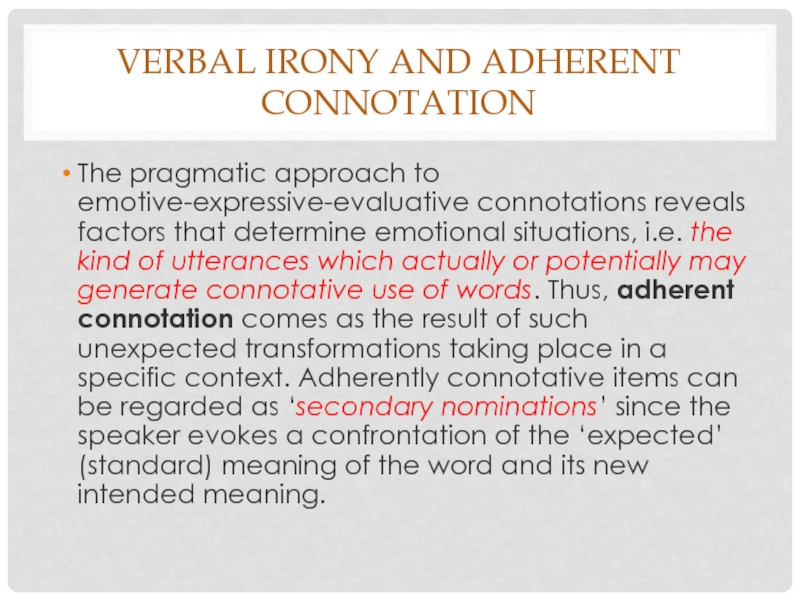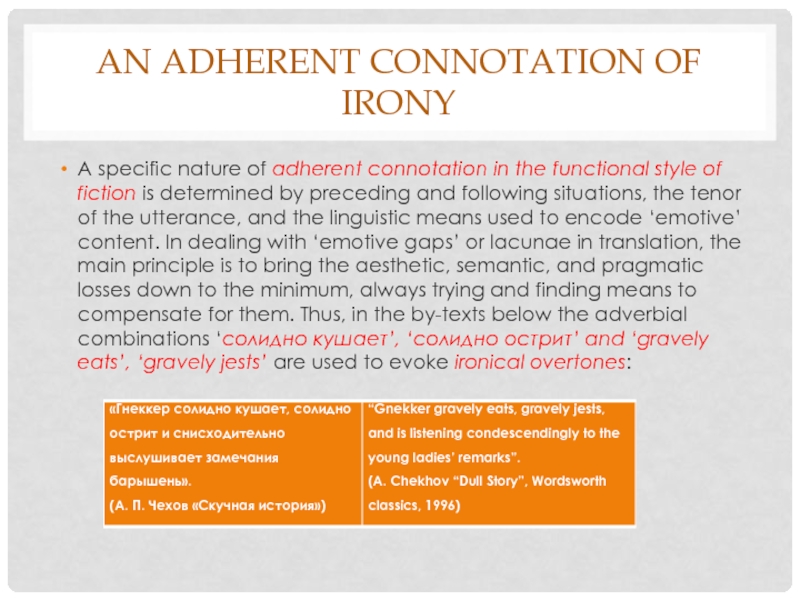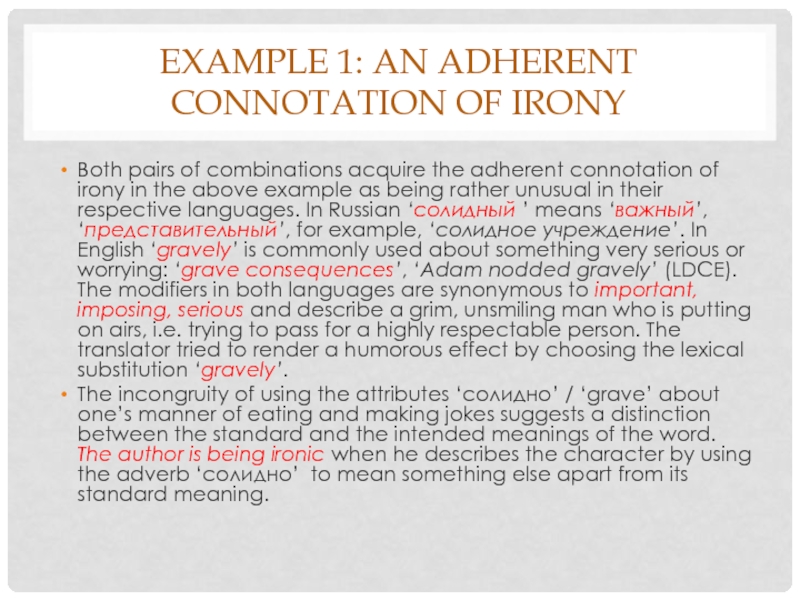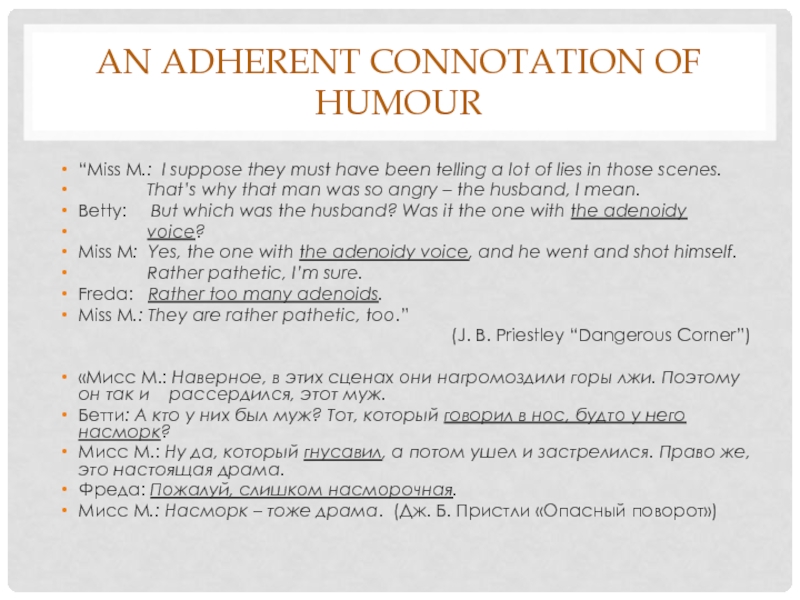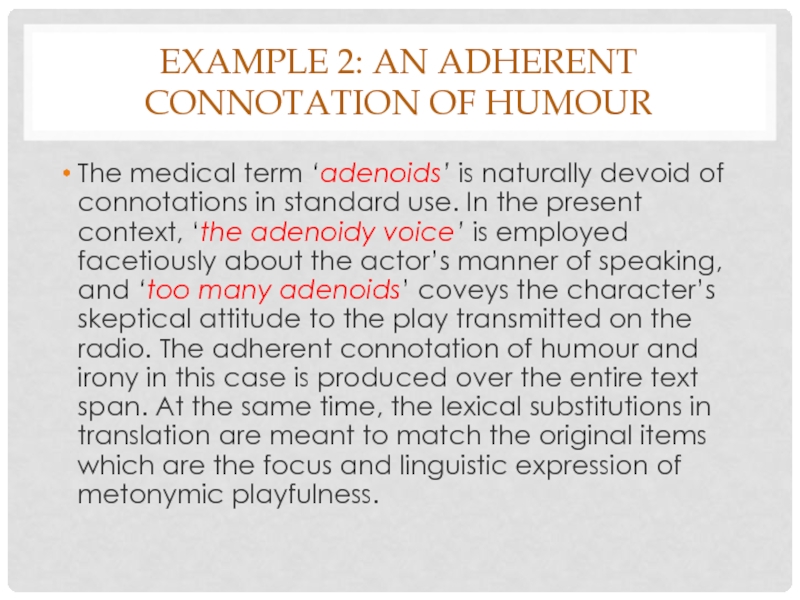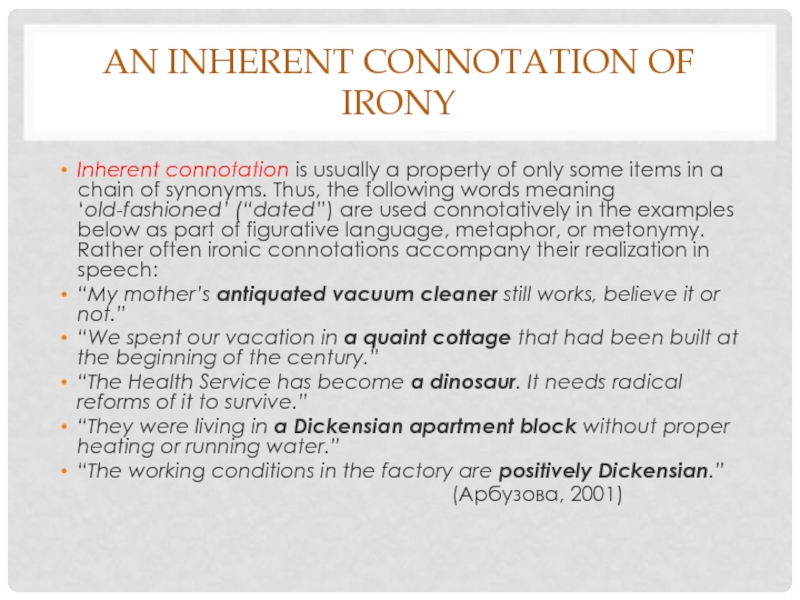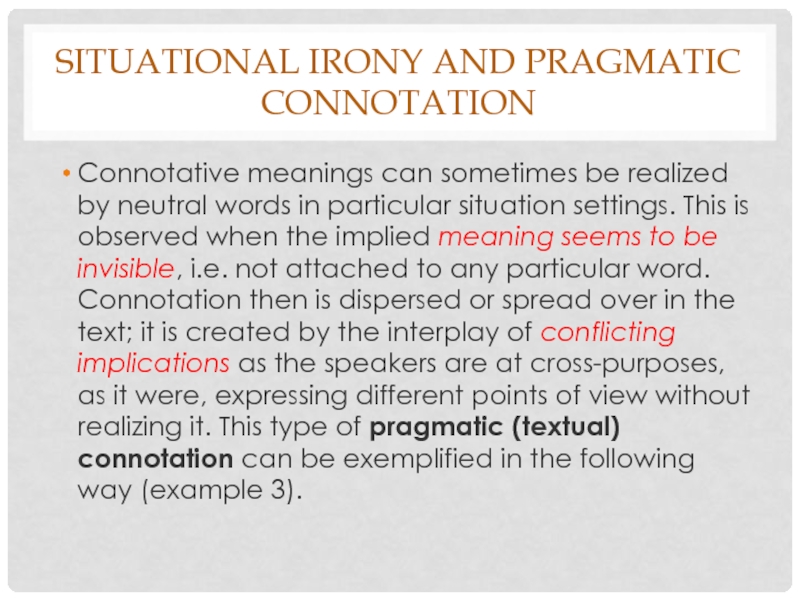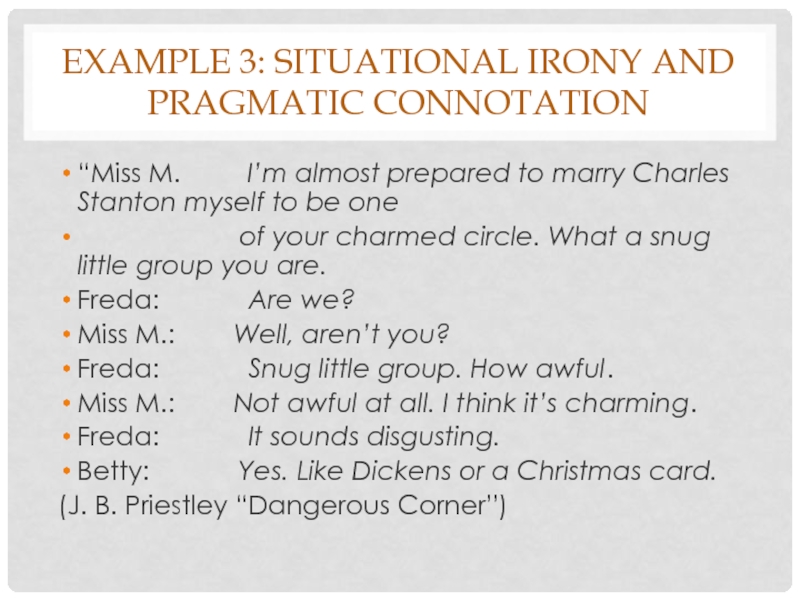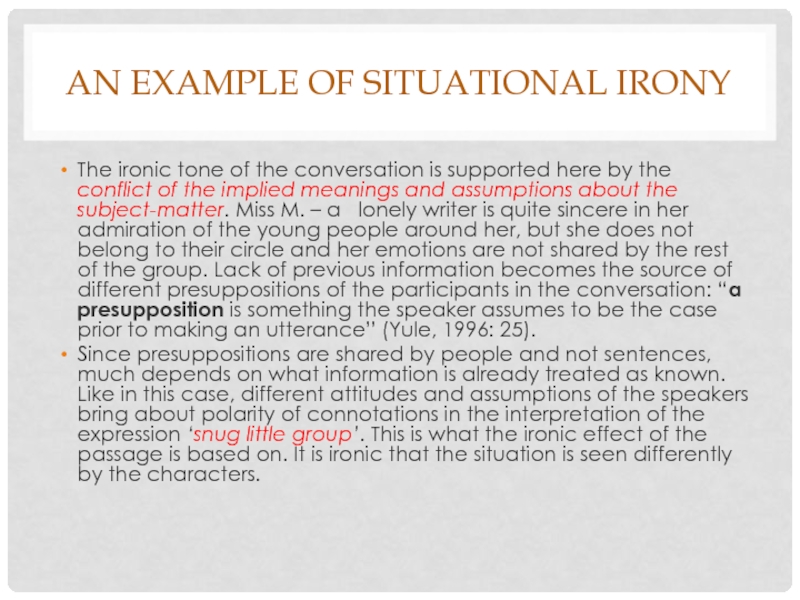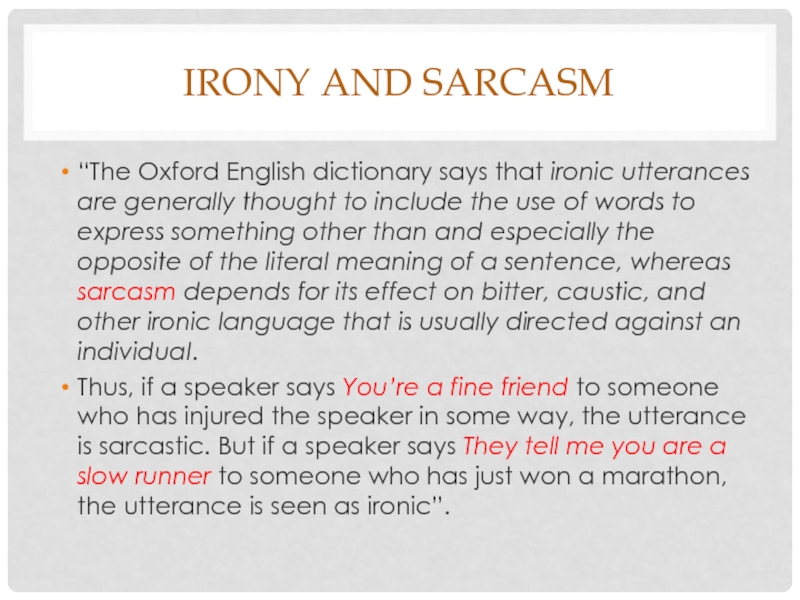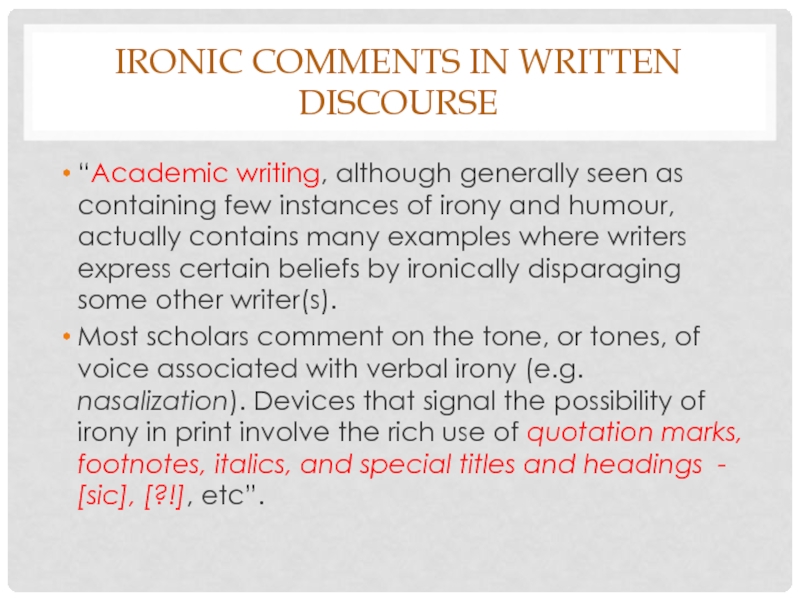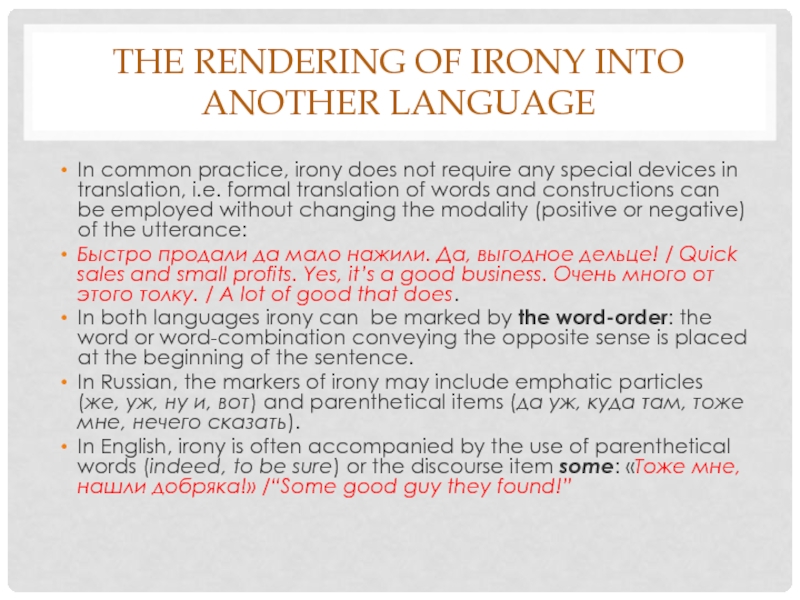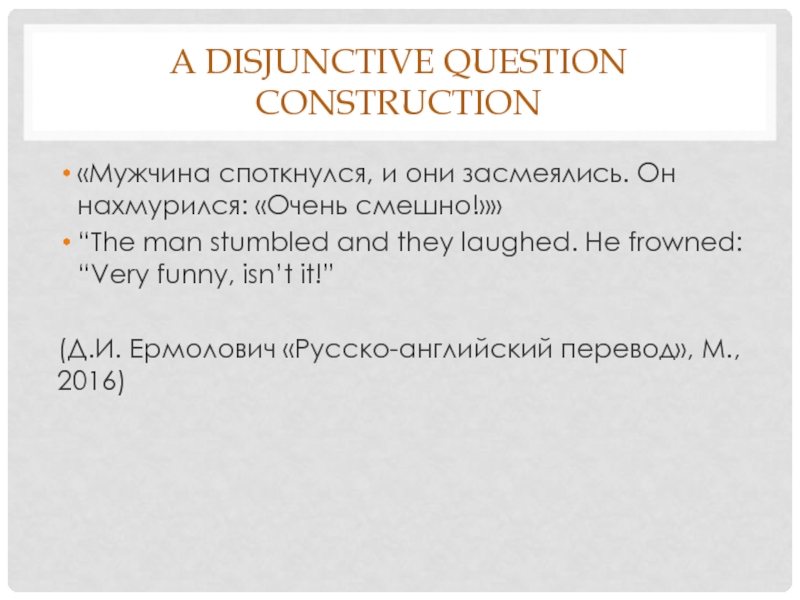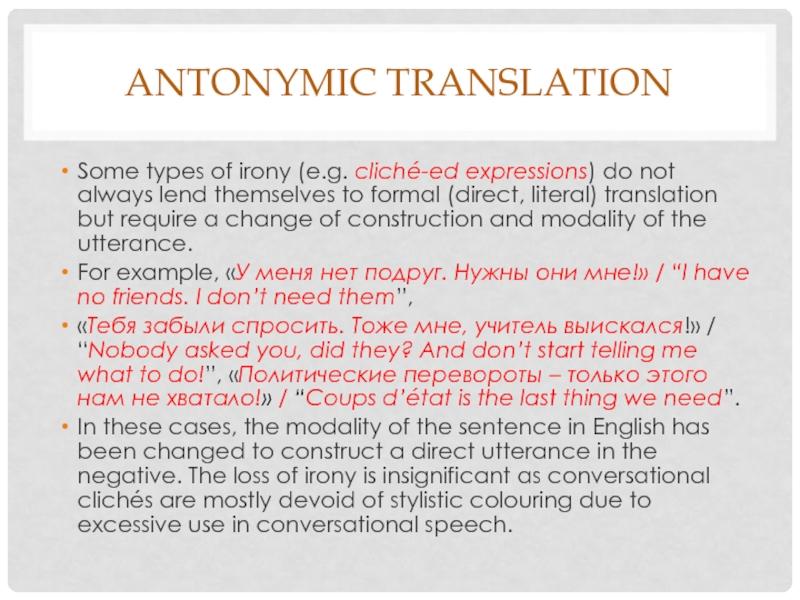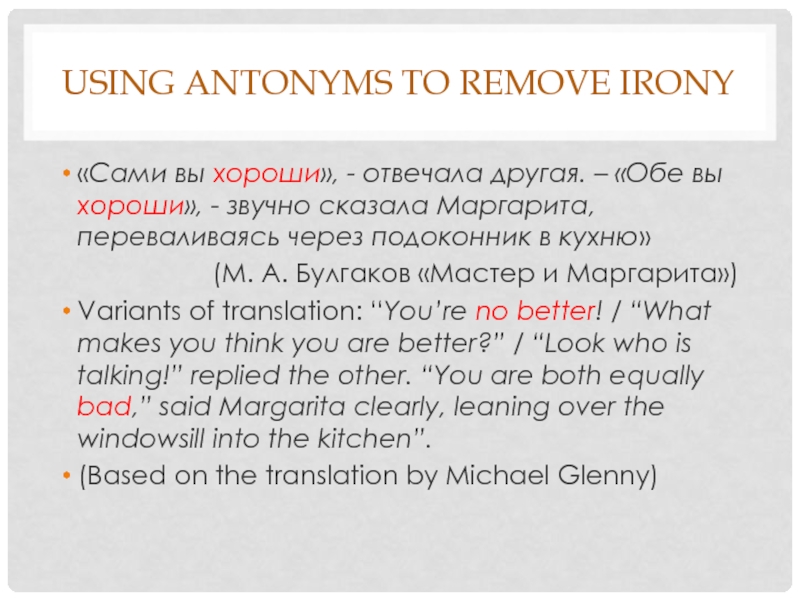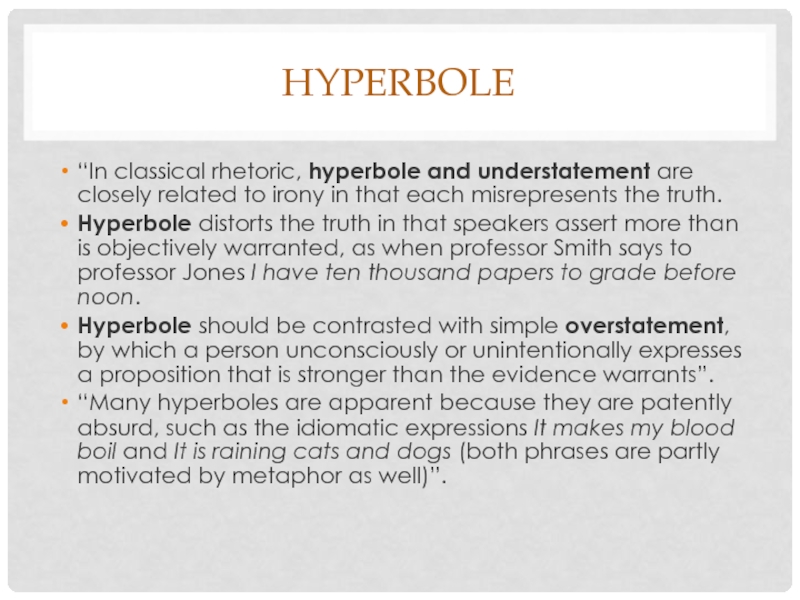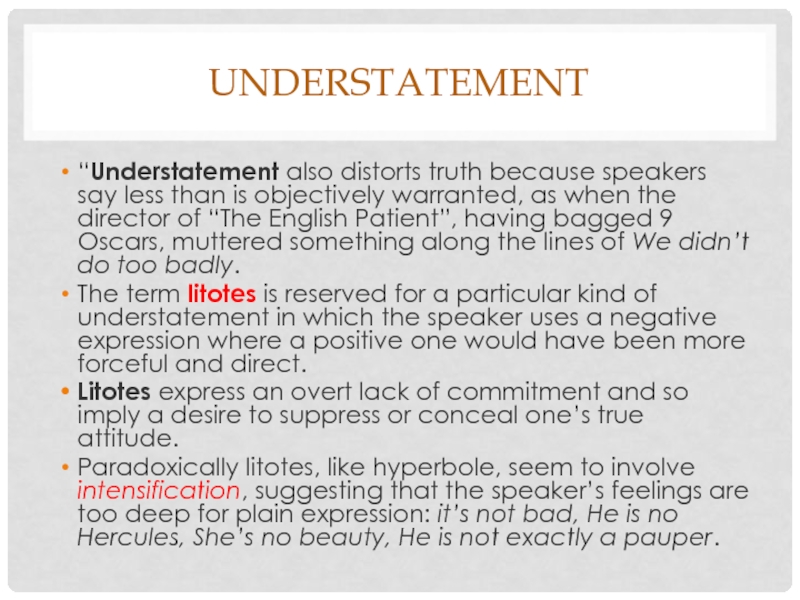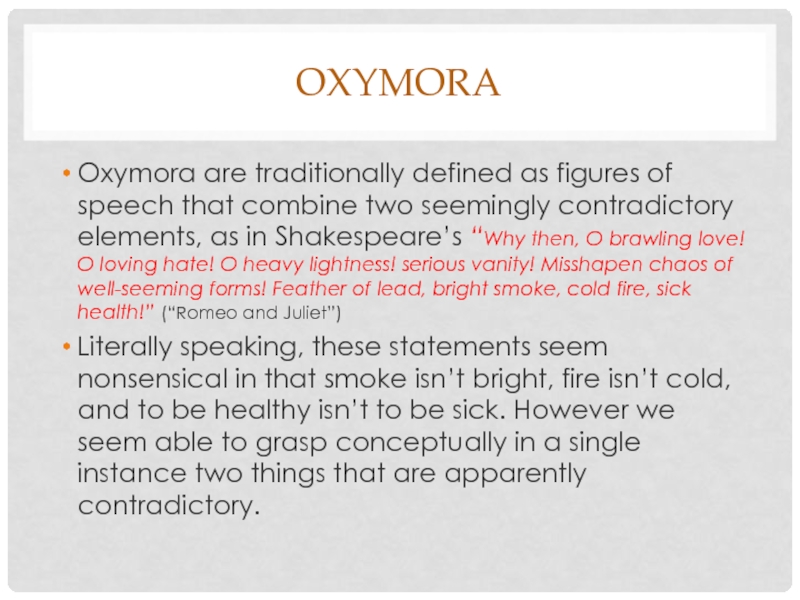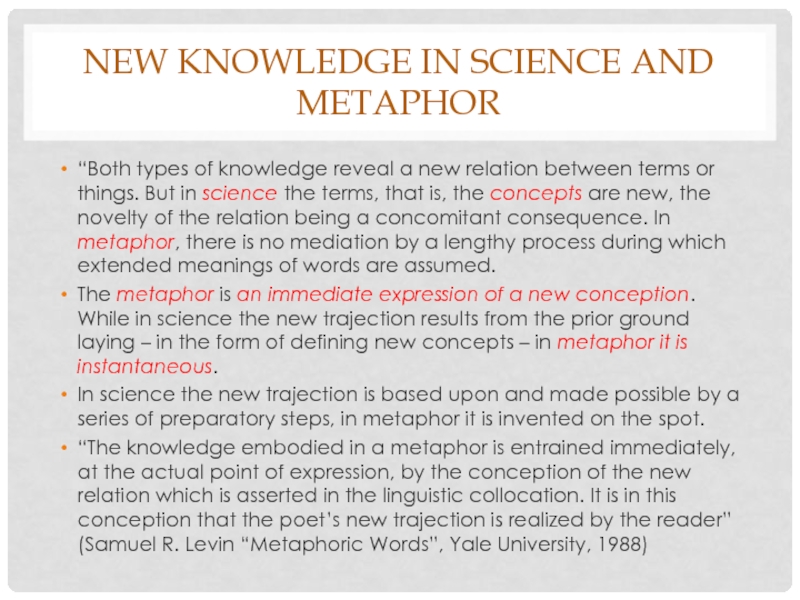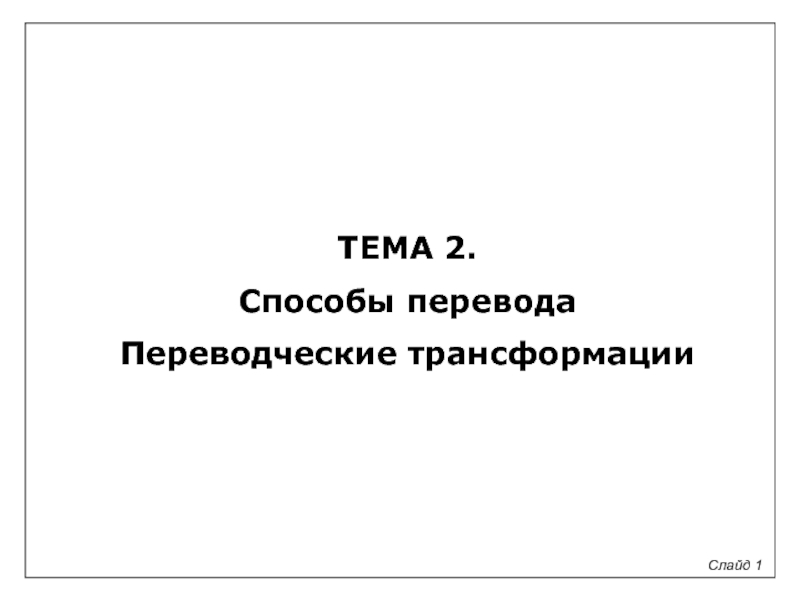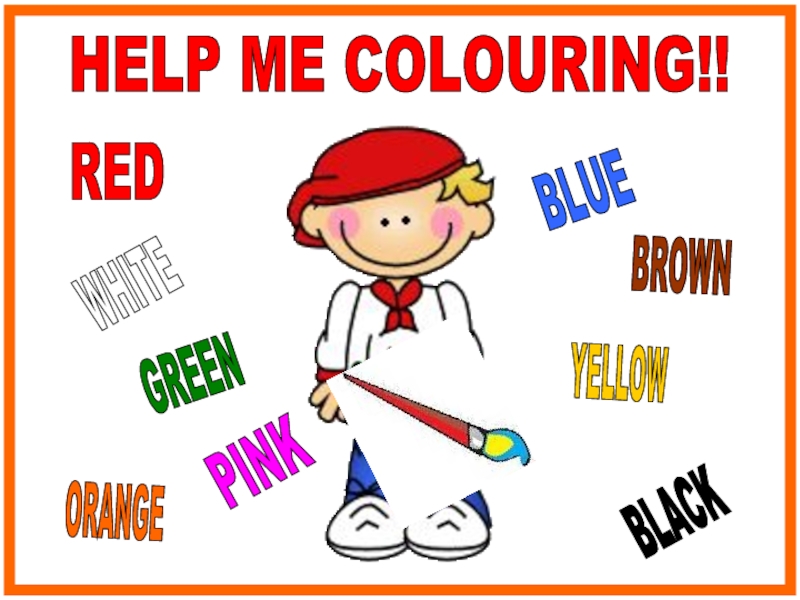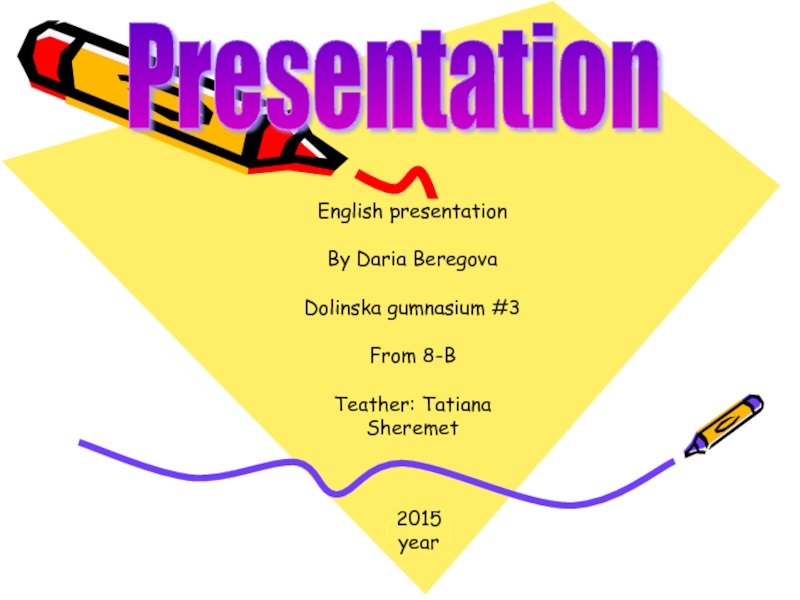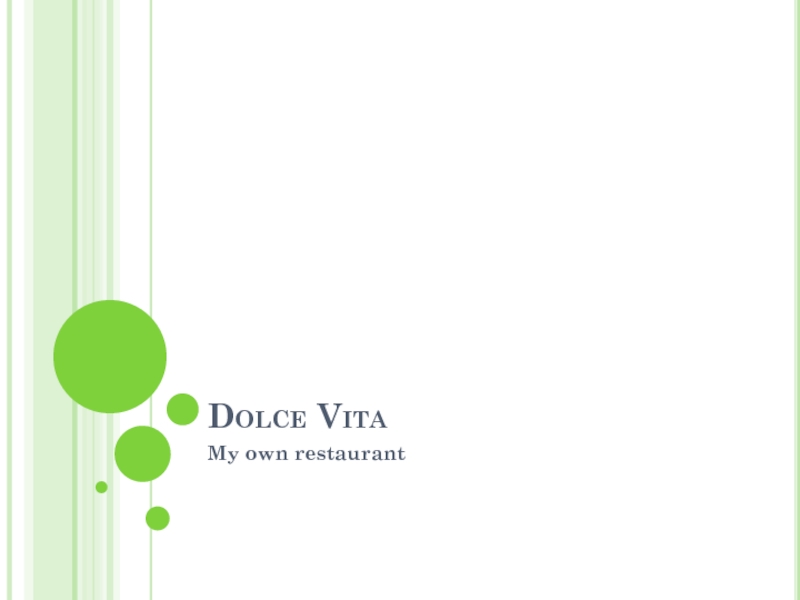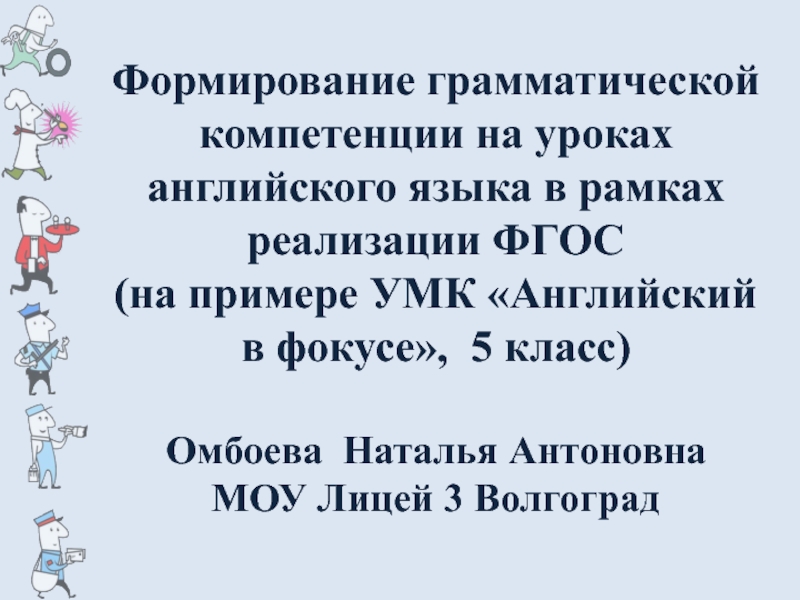- Главная
- Разное
- Дизайн
- Бизнес и предпринимательство
- Аналитика
- Образование
- Развлечения
- Красота и здоровье
- Финансы
- Государство
- Путешествия
- Спорт
- Недвижимость
- Армия
- Графика
- Культурология
- Еда и кулинария
- Лингвистика
- Английский язык
- Астрономия
- Алгебра
- Биология
- География
- Детские презентации
- Информатика
- История
- Литература
- Маркетинг
- Математика
- Медицина
- Менеджмент
- Музыка
- МХК
- Немецкий язык
- ОБЖ
- Обществознание
- Окружающий мир
- Педагогика
- Русский язык
- Технология
- Физика
- Философия
- Химия
- Шаблоны, картинки для презентаций
- Экология
- Экономика
- Юриспруденция
Contrastive lexicology 6. Pragmatic connotation, irony, understatement, hyperbole, oxymora презентация
Содержание
- 1. Contrastive lexicology 6. Pragmatic connotation, irony, understatement, hyperbole, oxymora
- 2. IRONY AND RELATED TROPES “Irony is traditionally
- 3. IRONY AS A DEVICE CONCEALING ONE’S TRUE
- 4. VERBAL AND SITUATIONAL IRONY “Verbal irony is
- 5. VERBAL IRONY AND ADHERENT CONNOTATION The pragmatic
- 6. AN ADHERENT CONNOTATION OF IRONY A specific
- 7. EXAMPLE 1: AN ADHERENT CONNOTATION OF IRONY
- 8. AN ADHERENT CONNOTATION OF HUMOUR “Miss
- 9. EXAMPLE 2: AN ADHERENT CONNOTATION OF HUMOUR
- 10. AN INHERENT CONNOTATION OF IRONY Inherent connotation
- 11. SITUATIONAL IRONY AND PRAGMATIC CONNOTATION Connotative meanings
- 12. EXAMPLE 3: SITUATIONAL IRONY AND PRAGMATIC CONNOTATION
- 13. AN EXAMPLE OF SITUATIONAL IRONY The ironic
- 14. IRONY AND SARCASM “The Oxford English dictionary
- 15. IRONIC COMMENTS IN WRITTEN DISCOURSE “Academic writing,
- 16. THE RENDERING OF IRONY INTO ANOTHER LANGUAGE
- 17. A DISJUNCTIVE QUESTION CONSTRUCTION «Мужчина споткнулся, и
- 18. ANTONYMIC TRANSLATION Some types of irony (e.g.
- 19. USING ANTONYMS TO REMOVE IRONY «Сами вы
- 20. HYPERBOLE “In classical rhetoric, hyperbole and
- 21. UNDERSTATEMENT “Understatement also distorts truth because speakers
- 22. OXYMORA Oxymora are traditionally defined as
- 23. UNDERSTANDING OF OXYMORA “George Bernard Shaw’s quip
- 24. NEW KNOWLEDGE IN SCIENCE AND METAPHOR “Both
Слайд 2IRONY AND RELATED TROPES
“Irony is traditionally seen as a situation that
contrasts what is expected with what occurs or as a statement that contradicts the actual attitude of the speaker”.
People speak and act ironically because they conceptualize many of their everyday experiences in terms of irony. Hence – the use of verbal irony and sarcasm as well as of related tropes – hyperbole, understatement, and oxymoron.
(R.W. Gibbs, Jr. “The Poetics of Mind”, p. 360)
People speak and act ironically because they conceptualize many of their everyday experiences in terms of irony. Hence – the use of verbal irony and sarcasm as well as of related tropes – hyperbole, understatement, and oxymoron.
(R.W. Gibbs, Jr. “The Poetics of Mind”, p. 360)
Слайд 3IRONY AS A DEVICE CONCEALING ONE’S TRUE ATTITUDE
“The ancient Greeks were
masters of irony, often using mockery to achieve important philosophical ends. Socrates pretended to be ignorant, as in Come now, my dear Euthyphro, inform me, that I may be wise, and under the pretense of seeking to learn, he taught others. He ironically asserted that he was never anyone’s teacher….”
The word irony comes from the Greek term eironia, which describes the main characteristics of the stock characters (the “ironical man” and the “imposter”) in early Greek comedies.
The imposter is the pompous fool who pretends to be more than he actually is. The ironical man is the shrewd dissembler who poses as less than he is. The conflict ends when the ironical man defeats the imposter.
The word irony comes from the Greek term eironia, which describes the main characteristics of the stock characters (the “ironical man” and the “imposter”) in early Greek comedies.
The imposter is the pompous fool who pretends to be more than he actually is. The ironical man is the shrewd dissembler who poses as less than he is. The conflict ends when the ironical man defeats the imposter.
Слайд 4VERBAL AND SITUATIONAL IRONY
“Verbal irony is recognized by literary scholars as
a technique of using incongruity to suggest a distinction between reality and expectation – saying one thing and meaning another – with the audience aware of both”.
“Situational irony reveals worldly events that are ironic by nature. Both verbal and situational irony involve a confrontation or juxtaposition of incompatibilities, but in verbal irony an individual presents or evokes such a confrontation by his or her utterance(s), whereas situational irony is something that just happens to be noticed as ironic”.
“Situational irony reveals worldly events that are ironic by nature. Both verbal and situational irony involve a confrontation or juxtaposition of incompatibilities, but in verbal irony an individual presents or evokes such a confrontation by his or her utterance(s), whereas situational irony is something that just happens to be noticed as ironic”.
Слайд 5VERBAL IRONY AND ADHERENT CONNOTATION
The pragmatic approach to emotive-expressive-evaluative connotations reveals
factors that determine emotional situations, i.e. the kind of utterances which actually or potentially may generate connotative use of words. Thus, adherent connotation comes as the result of such unexpected transformations taking place in a specific context. Adherently connotative items can be regarded as ‘secondary nominations’ since the speaker evokes a confrontation of the ‘expected’ (standard) meaning of the word and its new intended meaning.
Слайд 6AN ADHERENT CONNOTATION OF IRONY
A specific nature of adherent connotation in
the functional style of fiction is determined by preceding and following situations, the tenor of the utterance, and the linguistic means used to encode ‘emotive’ content. In dealing with ‘emotive gaps’ or lacunae in translation, the main principle is to bring the aesthetic, semantic, and pragmatic losses down to the minimum, always trying and finding means to compensate for them. Thus, in the by-texts below the adverbial combinations ‘солидно кушает’, ‘солидно острит’ and ‘gravely eats’, ‘gravely jests’ are used to evoke ironical overtones:
Слайд 7EXAMPLE 1: AN ADHERENT CONNOTATION OF IRONY
Both pairs of combinations acquire
the adherent connotation of irony in the above example as being rather unusual in their respective languages. In Russian ‘солидный ’ means ‘важный’, ‘представительный’, for example, ‘солидное учреждение’. In English ‘gravely’ is commonly used about something very serious or worrying: ‘grave consequences’, ‘Adam nodded gravely’ (LDCE). The modifiers in both languages are synonymous to important, imposing, serious and describe a grim, unsmiling man who is putting on airs, i.e. trying to pass for a highly respectable person. The translator tried to render a humorous effect by choosing the lexical substitution ‘gravely’.
The incongruity of using the attributes ‘солидно’ / ‘grave’ about one’s manner of eating and making jokes suggests a distinction between the standard and the intended meanings of the word. The author is being ironic when he describes the character by using the adverb ‘солидно’ to mean something else apart from its standard meaning.
The incongruity of using the attributes ‘солидно’ / ‘grave’ about one’s manner of eating and making jokes suggests a distinction between the standard and the intended meanings of the word. The author is being ironic when he describes the character by using the adverb ‘солидно’ to mean something else apart from its standard meaning.
Слайд 8AN ADHERENT CONNOTATION OF HUMOUR
“Miss M.: I suppose they must
have been telling a lot of lies in those scenes.
That’s why that man was so angry – the husband, I mean.
Betty: But which was the husband? Was it the one with the adenoidy
voice?
Miss M: Yes, the one with the adenoidy voice, and he went and shot himself.
Rather pathetic, I’m sure.
Freda: Rather too many adenoids.
Miss M.: They are rather pathetic, too.”
(J. B. Priestley “Dangerous Corner”)
«Мисс М.: Наверное, в этих сценах они нагромоздили горы лжи. Поэтому он так и рассердился, этот муж.
Бетти: А кто у них был муж? Тот, который говорил в нос, будто у него насморк?
Мисс М.: Ну да, который гнусавил, а потом ушел и застрелился. Право же, это настоящая драма.
Фреда: Пожалуй, слишком насморочная.
Мисс М.: Насморк – тоже драма. (Дж. Б. Пристли «Опасный поворот»)
That’s why that man was so angry – the husband, I mean.
Betty: But which was the husband? Was it the one with the adenoidy
voice?
Miss M: Yes, the one with the adenoidy voice, and he went and shot himself.
Rather pathetic, I’m sure.
Freda: Rather too many adenoids.
Miss M.: They are rather pathetic, too.”
(J. B. Priestley “Dangerous Corner”)
«Мисс М.: Наверное, в этих сценах они нагромоздили горы лжи. Поэтому он так и рассердился, этот муж.
Бетти: А кто у них был муж? Тот, который говорил в нос, будто у него насморк?
Мисс М.: Ну да, который гнусавил, а потом ушел и застрелился. Право же, это настоящая драма.
Фреда: Пожалуй, слишком насморочная.
Мисс М.: Насморк – тоже драма. (Дж. Б. Пристли «Опасный поворот»)
Слайд 9EXAMPLE 2: AN ADHERENT CONNOTATION OF HUMOUR
The medical term ‘adenoids’
is naturally devoid of connotations in standard use. In the present context, ‘the adenoidy voice’ is employed facetiously about the actor’s manner of speaking, and ‘too many adenoids’ coveys the character’s skeptical attitude to the play transmitted on the radio. The adherent connotation of humour and irony in this case is produced over the entire text span. At the same time, the lexical substitutions in translation are meant to match the original items which are the focus and linguistic expression of metonymic playfulness.
Слайд 10AN INHERENT CONNOTATION OF IRONY
Inherent connotation is usually a property of
only some items in a chain of synonyms. Thus, the following words meaning ‘old-fashioned’ (“dated”) are used connotatively in the examples below as part of figurative language, metaphor, or metonymy. Rather often ironic connotations accompany their realization in speech:
“My mother’s antiquated vacuum cleaner still works, believe it or not.”
“We spent our vacation in a quaint cottage that had been built at the beginning of the century.”
“The Health Service has become a dinosaur. It needs radical reforms of it to survive.”
“They were living in a Dickensian apartment block without proper heating or running water.”
“The working conditions in the factory are positively Dickensian.”
(Арбузова, 2001)
“My mother’s antiquated vacuum cleaner still works, believe it or not.”
“We spent our vacation in a quaint cottage that had been built at the beginning of the century.”
“The Health Service has become a dinosaur. It needs radical reforms of it to survive.”
“They were living in a Dickensian apartment block without proper heating or running water.”
“The working conditions in the factory are positively Dickensian.”
(Арбузова, 2001)
Слайд 11SITUATIONAL IRONY AND PRAGMATIC CONNOTATION
Connotative meanings can sometimes be realized by
neutral words in particular situation settings. This is observed when the implied meaning seems to be invisible, i.e. not attached to any particular word. Connotation then is dispersed or spread over in the text; it is created by the interplay of conflicting implications as the speakers are at cross-purposes, as it were, expressing different points of view without realizing it. This type of pragmatic (textual) connotation can be exemplified in the following way (example 3).
Слайд 12EXAMPLE 3: SITUATIONAL IRONY AND PRAGMATIC CONNOTATION
“Miss M.
I’m almost prepared to marry Charles Stanton myself to be one
of your charmed circle. What a snug little group you are.
Freda: Are we?
Miss M.: Well, aren’t you?
Freda: Snug little group. How awful.
Miss M.: Not awful at all. I think it’s charming.
Freda: It sounds disgusting.
Betty: Yes. Like Dickens or a Christmas card.
(J. B. Priestley “Dangerous Corner”)
of your charmed circle. What a snug little group you are.
Freda: Are we?
Miss M.: Well, aren’t you?
Freda: Snug little group. How awful.
Miss M.: Not awful at all. I think it’s charming.
Freda: It sounds disgusting.
Betty: Yes. Like Dickens or a Christmas card.
(J. B. Priestley “Dangerous Corner”)
Слайд 13AN EXAMPLE OF SITUATIONAL IRONY
The ironic tone of the conversation is
supported here by the conflict of the implied meanings and assumptions about the subject-matter. Miss M. – a lonely writer is quite sincere in her admiration of the young people around her, but she does not belong to their circle and her emotions are not shared by the rest of the group. Lack of previous information becomes the source of different presuppositions of the participants in the conversation: “a presupposition is something the speaker assumes to be the case prior to making an utterance” (Yule, 1996: 25).
Since presuppositions are shared by people and not sentences, much depends on what information is already treated as known. Like in this case, different attitudes and assumptions of the speakers bring about polarity of connotations in the interpretation of the expression ‘snug little group’. This is what the ironic effect of the passage is based on. It is ironic that the situation is seen differently by the characters.
Since presuppositions are shared by people and not sentences, much depends on what information is already treated as known. Like in this case, different attitudes and assumptions of the speakers bring about polarity of connotations in the interpretation of the expression ‘snug little group’. This is what the ironic effect of the passage is based on. It is ironic that the situation is seen differently by the characters.
Слайд 14IRONY AND SARCASM
“The Oxford English dictionary says that ironic utterances are
generally thought to include the use of words to express something other than and especially the opposite of the literal meaning of a sentence, whereas sarcasm depends for its effect on bitter, caustic, and other ironic language that is usually directed against an individual.
Thus, if a speaker says You’re a fine friend to someone who has injured the speaker in some way, the utterance is sarcastic. But if a speaker says They tell me you are a slow runner to someone who has just won a marathon, the utterance is seen as ironic”.
Thus, if a speaker says You’re a fine friend to someone who has injured the speaker in some way, the utterance is sarcastic. But if a speaker says They tell me you are a slow runner to someone who has just won a marathon, the utterance is seen as ironic”.
Слайд 15IRONIC COMMENTS IN WRITTEN DISCOURSE
“Academic writing, although generally seen as containing
few instances of irony and humour, actually contains many examples where writers express certain beliefs by ironically disparaging some other writer(s).
Most scholars comment on the tone, or tones, of voice associated with verbal irony (e.g. nasalization). Devices that signal the possibility of irony in print involve the rich use of quotation marks, footnotes, italics, and special titles and headings - [sic], [?!], etc”.
Most scholars comment on the tone, or tones, of voice associated with verbal irony (e.g. nasalization). Devices that signal the possibility of irony in print involve the rich use of quotation marks, footnotes, italics, and special titles and headings - [sic], [?!], etc”.
Слайд 16THE RENDERING OF IRONY INTO ANOTHER LANGUAGE
In common practice, irony does
not require any special devices in translation, i.e. formal translation of words and constructions can be employed without changing the modality (positive or negative) of the utterance:
Быстро продали да мало нажили. Да, выгодное дельце! / Quick sales and small profits. Yes, it’s a good business. Очень много от этого толку. / A lot of good that does.
In both languages irony can be marked by the word-order: the word or word-combination conveying the opposite sense is placed at the beginning of the sentence.
In Russian, the markers of irony may include emphatic particles (же, уж, ну и, вот) and parenthetical items (да уж, куда там, тоже мне, нечего сказать).
In English, irony is often accompanied by the use of parenthetical words (indeed, to be sure) or the discourse item some: «Тоже мне, нашли добряка!» /“Some good guy they found!”
Быстро продали да мало нажили. Да, выгодное дельце! / Quick sales and small profits. Yes, it’s a good business. Очень много от этого толку. / A lot of good that does.
In both languages irony can be marked by the word-order: the word or word-combination conveying the opposite sense is placed at the beginning of the sentence.
In Russian, the markers of irony may include emphatic particles (же, уж, ну и, вот) and parenthetical items (да уж, куда там, тоже мне, нечего сказать).
In English, irony is often accompanied by the use of parenthetical words (indeed, to be sure) or the discourse item some: «Тоже мне, нашли добряка!» /“Some good guy they found!”
Слайд 17A DISJUNCTIVE QUESTION CONSTRUCTION
«Мужчина споткнулся, и они засмеялись. Он нахмурился: «Очень
смешно!»»
“The man stumbled and they laughed. He frowned: “Very funny, isn’t it!”
(Д.И. Ермолович «Русско-английский перевод», М., 2016)
“The man stumbled and they laughed. He frowned: “Very funny, isn’t it!”
(Д.И. Ермолович «Русско-английский перевод», М., 2016)
Слайд 18ANTONYMIC TRANSLATION
Some types of irony (e.g. cliché-ed expressions) do not always
lend themselves to formal (direct, literal) translation but require a change of construction and modality of the utterance.
For example, «У меня нет подруг. Нужны они мне!» / “I have no friends. I don’t need them”,
«Тебя забыли спросить. Тоже мне, учитель выискался!» / “Nobody asked you, did they? And don’t start telling me what to do!”, «Политические перевороты – только этого нам не хватало!» / “Coups d’état is the last thing we need”.
In these cases, the modality of the sentence in English has been changed to construct a direct utterance in the negative. The loss of irony is insignificant as conversational clichés are mostly devoid of stylistic colouring due to excessive use in conversational speech.
For example, «У меня нет подруг. Нужны они мне!» / “I have no friends. I don’t need them”,
«Тебя забыли спросить. Тоже мне, учитель выискался!» / “Nobody asked you, did they? And don’t start telling me what to do!”, «Политические перевороты – только этого нам не хватало!» / “Coups d’état is the last thing we need”.
In these cases, the modality of the sentence in English has been changed to construct a direct utterance in the negative. The loss of irony is insignificant as conversational clichés are mostly devoid of stylistic colouring due to excessive use in conversational speech.
Слайд 19USING ANTONYMS TO REMOVE IRONY
«Сами вы хороши», - отвечала другая. –
«Обе вы хороши», - звучно сказала Маргарита, переваливаясь через подоконник в кухню»
(М. А. Булгаков «Мастер и Маргарита»)
Variants of translation: “You’re no better! / “What makes you think you are better?” / “Look who is talking!” replied the other. “You are both equally bad,” said Margarita clearly, leaning over the windowsill into the kitchen”.
(Based on the translation by Michael Glenny)
(М. А. Булгаков «Мастер и Маргарита»)
Variants of translation: “You’re no better! / “What makes you think you are better?” / “Look who is talking!” replied the other. “You are both equally bad,” said Margarita clearly, leaning over the windowsill into the kitchen”.
(Based on the translation by Michael Glenny)
Слайд 20HYPERBOLE
“In classical rhetoric, hyperbole and understatement are closely related to
irony in that each misrepresents the truth.
Hyperbole distorts the truth in that speakers assert more than is objectively warranted, as when professor Smith says to professor Jones I have ten thousand papers to grade before noon.
Hyperbole should be contrasted with simple overstatement, by which a person unconsciously or unintentionally expresses a proposition that is stronger than the evidence warrants”.
“Many hyperboles are apparent because they are patently absurd, such as the idiomatic expressions It makes my blood boil and It is raining cats and dogs (both phrases are partly motivated by metaphor as well)”.
Hyperbole distorts the truth in that speakers assert more than is objectively warranted, as when professor Smith says to professor Jones I have ten thousand papers to grade before noon.
Hyperbole should be contrasted with simple overstatement, by which a person unconsciously or unintentionally expresses a proposition that is stronger than the evidence warrants”.
“Many hyperboles are apparent because they are patently absurd, such as the idiomatic expressions It makes my blood boil and It is raining cats and dogs (both phrases are partly motivated by metaphor as well)”.
Слайд 21UNDERSTATEMENT
“Understatement also distorts truth because speakers say less than is objectively
warranted, as when the director of “The English Patient”, having bagged 9 Oscars, muttered something along the lines of We didn’t do too badly.
The term litotes is reserved for a particular kind of understatement in which the speaker uses a negative expression where a positive one would have been more forceful and direct.
Litotes express an overt lack of commitment and so imply a desire to suppress or conceal one’s true attitude.
Paradoxically litotes, like hyperbole, seem to involve intensification, suggesting that the speaker’s feelings are too deep for plain expression: it’s not bad, He is no Hercules, She’s no beauty, He is not exactly a pauper.
The term litotes is reserved for a particular kind of understatement in which the speaker uses a negative expression where a positive one would have been more forceful and direct.
Litotes express an overt lack of commitment and so imply a desire to suppress or conceal one’s true attitude.
Paradoxically litotes, like hyperbole, seem to involve intensification, suggesting that the speaker’s feelings are too deep for plain expression: it’s not bad, He is no Hercules, She’s no beauty, He is not exactly a pauper.
Слайд 22OXYMORA
Oxymora are traditionally defined as figures of speech that combine
two seemingly contradictory elements, as in Shakespeare’s “Why then, O brawling love! O loving hate! O heavy lightness! serious vanity! Misshapen chaos of well-seeming forms! Feather of lead, bright smoke, cold fire, sick health!” (“Romeo and Juliet”)
Literally speaking, these statements seem nonsensical in that smoke isn’t bright, fire isn’t cold, and to be healthy isn’t to be sick. However we seem able to grasp conceptually in a single instance two things that are apparently contradictory.
Literally speaking, these statements seem nonsensical in that smoke isn’t bright, fire isn’t cold, and to be healthy isn’t to be sick. However we seem able to grasp conceptually in a single instance two things that are apparently contradictory.
Слайд 23UNDERSTANDING OF OXYMORA
“George Bernard Shaw’s quip America and England are two
countries separated by a common language makes immediate sense to us through our cultural understanding of these two nations, despite the contradiction of two entities being divided by something in common.
Oxymora like bright smoke, lead feathers, and sick health, do not simply represent figures of speech but also reflect poetic schemes for conceptualizing human experience and the external world.
More generally, oxymora are frequently found in everyday speech, and many are barely noticed as such, as in intense apathy, internal exile, man child, loyal opposition, pretty ugly, guest host, and so on”.
Oxymora like bright smoke, lead feathers, and sick health, do not simply represent figures of speech but also reflect poetic schemes for conceptualizing human experience and the external world.
More generally, oxymora are frequently found in everyday speech, and many are barely noticed as such, as in intense apathy, internal exile, man child, loyal opposition, pretty ugly, guest host, and so on”.
Слайд 24NEW KNOWLEDGE IN SCIENCE AND METAPHOR
“Both types of knowledge reveal a
new relation between terms or things. But in science the terms, that is, the concepts are new, the novelty of the relation being a concomitant consequence. In metaphor, there is no mediation by a lengthy process during which extended meanings of words are assumed.
The metaphor is an immediate expression of a new conception. While in science the new trajection results from the prior ground laying – in the form of defining new concepts – in metaphor it is instantaneous.
In science the new trajection is based upon and made possible by a series of preparatory steps, in metaphor it is invented on the spot.
“The knowledge embodied in a metaphor is entrained immediately, at the actual point of expression, by the conception of the new relation which is asserted in the linguistic collocation. It is in this conception that the poet’s new trajection is realized by the reader” (Samuel R. Levin “Metaphoric Words”, Yale University, 1988)
The metaphor is an immediate expression of a new conception. While in science the new trajection results from the prior ground laying – in the form of defining new concepts – in metaphor it is instantaneous.
In science the new trajection is based upon and made possible by a series of preparatory steps, in metaphor it is invented on the spot.
“The knowledge embodied in a metaphor is entrained immediately, at the actual point of expression, by the conception of the new relation which is asserted in the linguistic collocation. It is in this conception that the poet’s new trajection is realized by the reader” (Samuel R. Levin “Metaphoric Words”, Yale University, 1988)
